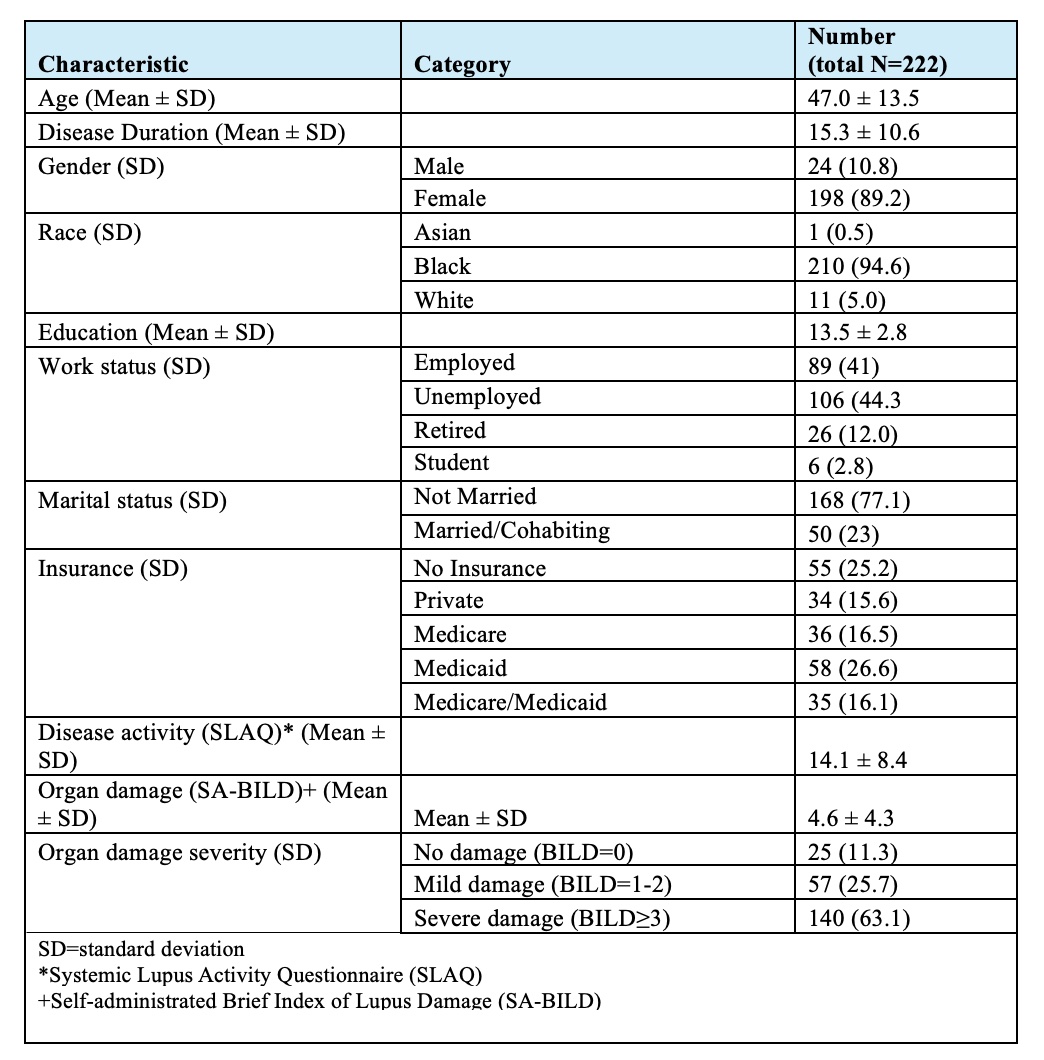Session Information
Date: Sunday, October 26, 2025
Title: (0671–0710) Systemic Sclerosis & Related Disorders – Clinical Poster I
Session Type: Poster Session A
Session Time: 10:30AM-12:30PM
Background/Purpose: People from underrepresented groups with SLE can face barriers to health care and management, including discrimination and a lack of resources and social and financial support. This can lead to missed appointment visits. Limited data exist on factors that contribute to appointment compliance rates. This study evaluates clinical and non-clinical factors and their association with missed appointments.
Methods: Patients with SLE in the Grady Rheumatology and Lupus Clinics from 2023-2024 who completed a Georgians Organized Against Lupus (GOAL) cohort survey within six months prior to a scheduled appointment were identified as having completed or missed their scheduled appointments. Grady Health System is the only indigent care health system in Atlanta, Georgia, whose patient population is primarily Black and of lower socioeconomic status. The GOAL cohort is a Centers For Disease Control and Prevention (CDC)-supported, population-based cohort of SLE patients followed prospectively through regular surveys with validated instruments. We assessed their demographics, socioeconomic factors, and psychosocial factors that could contribute to their appointment compliance. Univariable logistic regression analysis was conducted using a generalized estimating equation model with repeated measures for each characteristic. Multivariable analyses were then performed to explore the independent effect of important clinical and psychosocial factors.
Results: We identified 222 patients with 597 appointments, of which 447 visits (75%) were completed and 150 were missed (25%). Clinical and sociodemographic characteristics are shown in Table 1. We observed higher emotional support scores in patients who missed their Rheumatology appointment with an OR of 1.14 (1.00-1.30, p-value < 0.05). Additionally, patients who missed their appointments were younger (OR of 1.12, [1.03-1.21, p-value < 0.01]) and had less years of disease duration (OR of 1.15 [1.02-1.30], p-value 0.02).
Conclusion: Our study found an unexpected association between higher levels of emotional support and missed appointments. Some studies have suggested improved outcomes in patients with chronic disease in those with higher levels of emotional support from not only their family/friends but also their healthcare providers. Although healthcare providers can play a crucial role as a surrogate for emotional support in patients with chronic diseases by providing counseling, open communication, and resources for support groups, we hypothesize that some patients with sufficient social support may lack this additional motivation and be at higher risk for missed appointments. It is also notable that, apart from shorter disease duration, no other clinical or socioeconomic factor in our model was associated with missed appointments.
 Table 1: Sociodemographic and Clinical Features of Systemic Lupus Erythematosus Patients
Table 1: Sociodemographic and Clinical Features of Systemic Lupus Erythematosus Patients
.jpg) Table 2: Logistic Regression with Repeated Measures on Missed Appointments (n=597 appointments)
Table 2: Logistic Regression with Repeated Measures on Missed Appointments (n=597 appointments)
To cite this abstract in AMA style:
Karim S, Bao G, Dunlop-Thomas C, Lim S. When Can Support Lead to Missed Clinic Appointments in Patients with Systemic Lupus Erythematosus? [abstract]. Arthritis Rheumatol. 2025; 77 (suppl 9). https://acrabstracts.org/abstract/when-can-support-lead-to-missed-clinic-appointments-in-patients-with-systemic-lupus-erythematosus/. Accessed .« Back to ACR Convergence 2025
ACR Meeting Abstracts - https://acrabstracts.org/abstract/when-can-support-lead-to-missed-clinic-appointments-in-patients-with-systemic-lupus-erythematosus/
